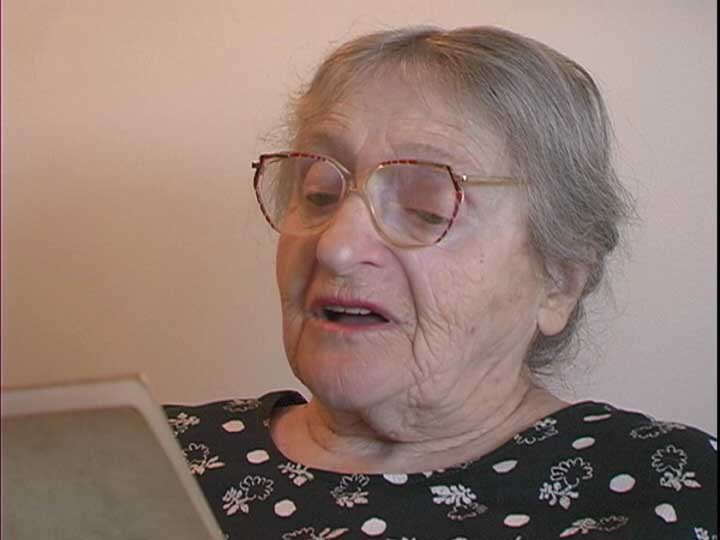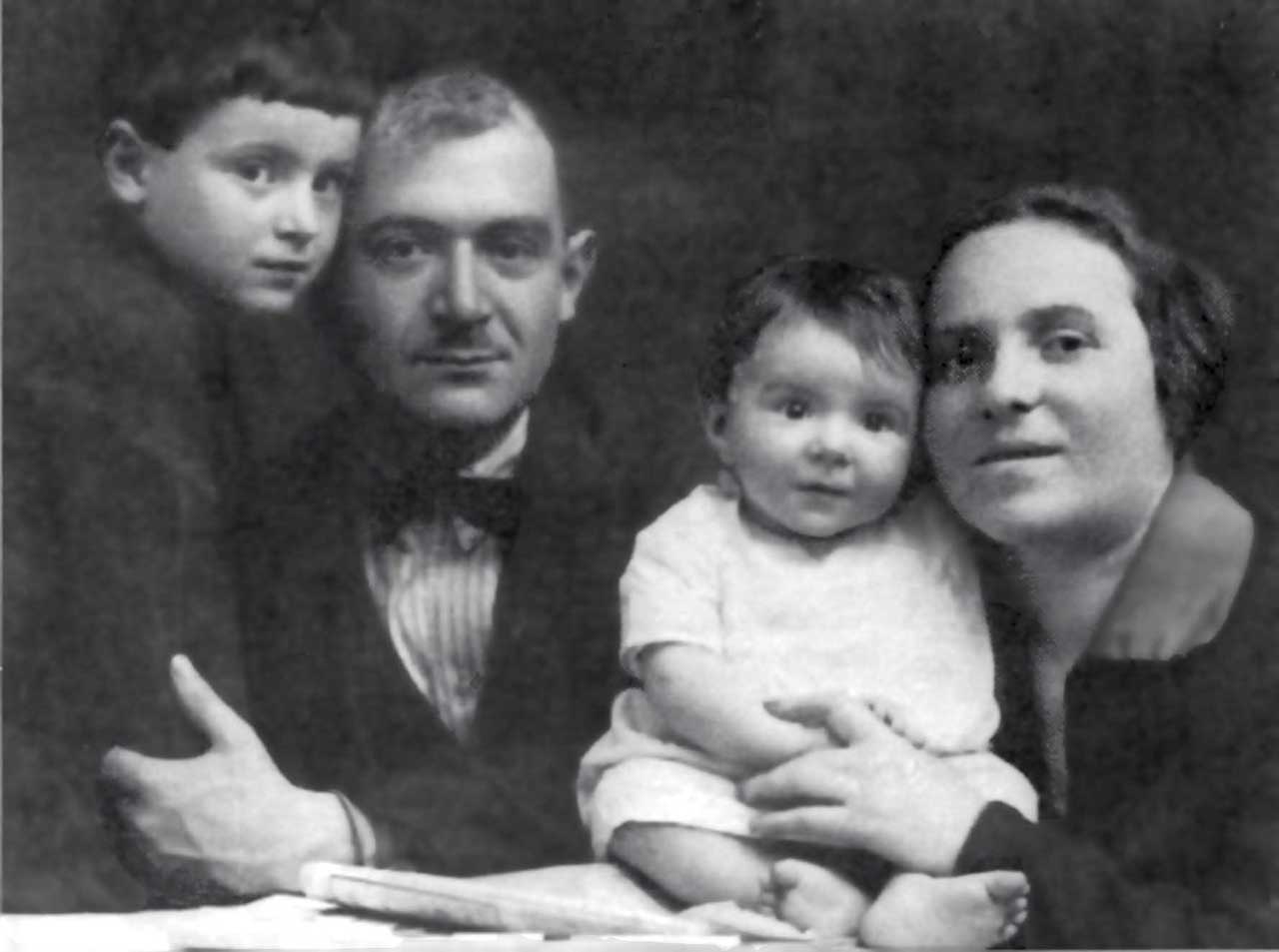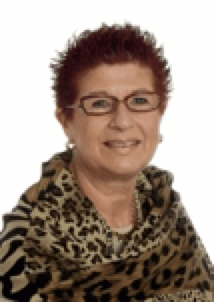חוה ראָזענפֿאַרב:
דאָס בלעזעלע וואָר
(דע־ווע־דע)
That Bubble of Being
(DVD)
Product Description
Click here for English
חוה ראָזענפֿאַרב:
פֿילם־באַשרײַבונג
Chava Rosenfarb: Film Description
In an article in Midstream Chava Rosenfarb wrote:
דאָס בלעזעלע וואָר
 אַן אַרטיקל אינעם ענגלישן זשורנאַל Midstream האָט די קאַנאַדער ייִדישע שרײַבערין און װיכטיקע חורבן־מחברטע חוה ראָזענפֿאַרב געשריבן: „אין אַן אַנדער אײראָפּעיִש שטעטל איז טעאָדאָר אַדאָרנאָ אַרױס מיט זײַן דעקלאַראַציע אַז נאָך אױשװיץ קען מער נישט זײַן קײן פּאָעזיע. אַ באַטײַטיקע, שטאַרקע דעקלאַראַציע, אָבער עס האָט גאָרנישט געהאַט צו טאָן מיט מיר".
אַן אַרטיקל אינעם ענגלישן זשורנאַל Midstream האָט די קאַנאַדער ייִדישע שרײַבערין און װיכטיקע חורבן־מחברטע חוה ראָזענפֿאַרב געשריבן: „אין אַן אַנדער אײראָפּעיִש שטעטל איז טעאָדאָר אַדאָרנאָ אַרױס מיט זײַן דעקלאַראַציע אַז נאָך אױשװיץ קען מער נישט זײַן קײן פּאָעזיע. אַ באַטײַטיקע, שטאַרקע דעקלאַראַציע, אָבער עס האָט גאָרנישט געהאַט צו טאָן מיט מיר".
אין דעם פֿילם חוה ראָזענפֿאַרב: דאָס בלעזעלע װאָר, באַשרײַבט זי, איר לעבן אין לאָדזש, פּױלן פֿאַר דעם חורבן, אירע יאָרן אין לאָדזשער געטאָ, אין אױשװיץ, און אין בערגען־בעלזען, װי אױך איר קאַריערע װי אַ ייִדישע שרײַבערין אין מאָנטרעאָל. נישט געקוקט אױף אַדאָרנאָס דעקלאַראַציע האָט ראָזענפֿאַרב געשריבן אַ סך, עלאָקװענט און רירנדיק װעגן דעם חורבן כאָטש זי אַלײן איז מודה אַז זי װײסט נישט אױב זי האָט געפֿונען די געהעריקע װערטער צו רעדן װעגן דעם.
זי דערציילט מיט אײַנזעעניש װעגן שרײַבן אין אַלגעמײן און װעגן דעם חורבן בפֿרט, װעגן לעבן און ליבע, און דער נאָכמלחמהדיקער ייִדיש־ליטעראַרישער סבֿיבֿה אין קאַנאַדע.
דער פֿילם — אַן אינטערװיו מיט חנה פֿישמאַן גאָנשאָר ניט לאַנג פֿאַר דער מחברטעס פּטירה — ווערט באַרײַכערט מיט פֿאָטאָגראַפֿיעס און מוזיק, דורכױס אױף ייִדיש מיט פּינקטלעכע און אַרומנעמיקע ענגלישע אונטערקעפּלעך. דער דע־ווע־דע איז אויך כּולל אַ זעלטענעם צוגאָב: ראָזענפֿאַרב לייענט פֿאָר פֿון איר פּאָעזיע און פּראָזע מיט אונטערקעפּלעך איבערגעזעצט פֿון קאַטרין העלערשטיין.
ניט געקוקט אױף דעם װאָס ראָזענפֿאַרב איז שױן געװען אין אירע לעצטע יאָרן און אױף דער צענטראַלקײט פֿון דער חורבן־טעמע איז ראָזענפֿאַרב אַ מחיהדיקער, פֿאַרכאַפּנדיקער סוזשעט, פֿול מיט חכמה, הומאָר חן.
ביאָגראַפֿיע
 חוה ראָזענפֿאַרב איז אַ פֿירנדיקע פּערזענלעכקייט אין דער נאָכמלחמהדיקער ייִדישער ליטעראַטור. אַ געבוירענע אין לאָדזש, פּוילן האָט זי דאָרטן זיך געלערנט אין אַ ייִדישער שול און דערנאָך פֿאַרענדיקט אַ פּוילישע גימנאַזיע. ווי אַ קינד האָט זי ליב געהאַט פּאָעזיע און האָט צו 8 יאָר אָנגעהויבן שרײַבן לידער. פֿון 1940 ביז 1944 האָט זי געלעבט אין לאָדזשער געטאָ. דאָרטן האָט זי אויסגעגאָסן איר האַרץ אין לירישער פּאָעזיע וואָס מע האָט שפּעטער צוגענומען בײַ איר אין אוישוויץ. איר ערשטע זאַמלונג געטאָלידער, די באַלאַדע פֿון נעכטיקן וואַלד, איז אַרויס אין לאָנדאָן אין 1947. נאָך דער מלחמה איז ראָזענפֿאַרב אַריבער קיין בעלגיע און אין 1950 האָט זי אימיגרירט קיין מאָנטראַל. דאָרטן האָט זי אָנגעשריבן און אַרויסגעגעבן/פּובליקירט די פּיעסע, דער פֿויגל פֿון געטאָ, (1958) וועגן דער מאַרטירערשאַפֿט פֿון איציק וויטענבערג, דעם קאָמענדאַנט פֿון די ווילנער פּאַרטיזאַנערס. די פּיעסע איז איבערגעזעצט געוואָרן אויף עבֿריתּ און איז אויפֿגעפֿירט געוואָרן פֿון דעם הבימה־טעאַטער אין ישׂראל אין 1966. זי איז אַריבער צו פּראָזע און אין 1972 האָט זי אַרויסגעגעבן איר מײַסטערווערק, דער בוים פֿון לעבן, אַ טרילאָגיע וועגן לאָדזשער געטאָ.
חוה ראָזענפֿאַרב איז אַ פֿירנדיקע פּערזענלעכקייט אין דער נאָכמלחמהדיקער ייִדישער ליטעראַטור. אַ געבוירענע אין לאָדזש, פּוילן האָט זי דאָרטן זיך געלערנט אין אַ ייִדישער שול און דערנאָך פֿאַרענדיקט אַ פּוילישע גימנאַזיע. ווי אַ קינד האָט זי ליב געהאַט פּאָעזיע און האָט צו 8 יאָר אָנגעהויבן שרײַבן לידער. פֿון 1940 ביז 1944 האָט זי געלעבט אין לאָדזשער געטאָ. דאָרטן האָט זי אויסגעגאָסן איר האַרץ אין לירישער פּאָעזיע וואָס מע האָט שפּעטער צוגענומען בײַ איר אין אוישוויץ. איר ערשטע זאַמלונג געטאָלידער, די באַלאַדע פֿון נעכטיקן וואַלד, איז אַרויס אין לאָנדאָן אין 1947. נאָך דער מלחמה איז ראָזענפֿאַרב אַריבער קיין בעלגיע און אין 1950 האָט זי אימיגרירט קיין מאָנטראַל. דאָרטן האָט זי אָנגעשריבן און אַרויסגעגעבן/פּובליקירט די פּיעסע, דער פֿויגל פֿון געטאָ, (1958) וועגן דער מאַרטירערשאַפֿט פֿון איציק וויטענבערג, דעם קאָמענדאַנט פֿון די ווילנער פּאַרטיזאַנערס. די פּיעסע איז איבערגעזעצט געוואָרן אויף עבֿריתּ און איז אויפֿגעפֿירט געוואָרן פֿון דעם הבימה־טעאַטער אין ישׂראל אין 1966. זי איז אַריבער צו פּראָזע און אין 1972 האָט זי אַרויסגעגעבן איר מײַסטערווערק, דער בוים פֿון לעבן, אַ טרילאָגיע וועגן לאָדזשער געטאָ.
צי אין פּאָעזיע, דראַמע, דערציילונג אָדער ראָמאַן, פֿליסן אַלע ראָזענפֿאַרבס ווערק פֿון אירע איבערלעבונגען בשעת דעם חורבן. ווי זי אַליין האָט עס אויסגעדריקט אין אַן אינטערוויו פֿאַר ראַדיאָ סי־בי־סי (2001), „די געטאָ איז געווען די ערד אויף וועלכער איך בין טאַקע אויסגעוואָקסן... אין געטאָ איז דער מענטש געווען נשמה־נאַקעט. דאָס וואָס איך האָב דאָרטן געזען, דאָס וואָס איך האָב זיך דאָרטן געלערנט האָט מיר געגעבן מײַן פּערספּעקטיוו אויף דער מענטשלעכער עקסיסטענץ, אויף מענטשן, אויפֿן לעבן בכלל".
ראָזענפֿאַרב האָט באַקומען אַ סך ליטעראַרישע פּרעמיעס און כּיבודים, צווישן אַנדערע די י.־י. סיגאַל־פּרעמיע, 1993, די מאַנגער־פּרעמיע, 1979 און אַ כּבֿוד־דאָקטאָראַט פֿון לעטברידזשער אוניווערסיטיט אין דער קאַנאַדער שטאָט מיטן זעלבן נאָמען אין וועלכער זי האָט געוווינט ביז זי איז געשטאָרבן אין 2011.
אינטערװיויִרער
 חנה פֿישמאַן גאָנשאָר, פֿאַקולטעט־לעקטאָר אין ייִדיש־לימודים אין דעם אָפּטײל פֿון ייִדישע שטודיעס אין מעגיל־אוניװערסיטעט אין מאָנטרעאָל, איז אױך אױפֿן פֿאַקולטעט פֿון דער זומער־פּראָגראַם אין דער ייִדישער שפּראַך, ליטעראַטור און קולטור א״נ אוריאל װײַנרײַך בײַ דעם ייִדישן װיסנשאַפֿטלעכן אינסטיטוט — ייִװאָ. װי אַן איבערזעצערין נעמט איר אַרבעט אַרײַן פֿילם, אַקאַדעמישע אַרטיקלען און אַרכיװאַלע מאַטעריאַלן. זי איז אַ געבױרענע ייִדיש־רעדערין װאָס איז אַ לעבן לאַנג פֿאַרבונדן מיט, און אַרײַנגעטאָן אין, דער װעלט פֿון ייִדיש.
חנה פֿישמאַן גאָנשאָר, פֿאַקולטעט־לעקטאָר אין ייִדיש־לימודים אין דעם אָפּטײל פֿון ייִדישע שטודיעס אין מעגיל־אוניװערסיטעט אין מאָנטרעאָל, איז אױך אױפֿן פֿאַקולטעט פֿון דער זומער־פּראָגראַם אין דער ייִדישער שפּראַך, ליטעראַטור און קולטור א״נ אוריאל װײַנרײַך בײַ דעם ייִדישן װיסנשאַפֿטלעכן אינסטיטוט — ייִװאָ. װי אַן איבערזעצערין נעמט איר אַרבעט אַרײַן פֿילם, אַקאַדעמישע אַרטיקלען און אַרכיװאַלע מאַטעריאַלן. זי איז אַ געבױרענע ייִדיש־רעדערין װאָס איז אַ לעבן לאַנג פֿאַרבונדן מיט, און אַרײַנגעטאָן אין, דער װעלט פֿון ייִדיש.
רעזשיסאָר
דזשאַש װאַלעצקי
פּובליקיר־אינפֿאָרמאַציע
חוה ראָזענפֿאַרב: דאָס בלעזעלע וואָר. דאָקומענטאַר. 75 מינוט פּלוס 35־מינוטיקער צוגאָב פֿון פֿירלייענען. רעזשיסאָר: דזשאַש װאַלעצקי. אינטערװיויִרער: חנה פֿישמאַן גאָנשאָר. אױספֿיר־פּראָדוצירער: שבֿע צוקער. צו באַקומען אין DVD (דיסק)־פֿאָרמאַט. אַרױסגעגעבן פֿון דער ייִדיש־ליגע, 2015.
That Bubble of Being
“… in another European town Theodore Adorno
has come out with the sweeping declaration that
there is no poetry after Auschwitz. A meaningful,
powerful declaration, but it has nothing to do with me.”
(Midstream, April 1989)
In the film Chava Rosenfarb: That Bubble of Being, Chava Rosenfarb, noted Canadian Yiddish writer and major Holocaust literary figure, discusses her life in Lodz, Poland before the Holocaust, her years in the Lodz Ghetto, in Auschwitz, in Bergen-Belsen, and her career as a Yiddish writer in Montreal. Despite Adorno’s declaration Rosenfarb wrote copiously, eloquently and movingly about the Holocaust even though she herself admits in the film that she doesn’t know if she has found the right words to talk about it.
She offers insights into writing in general and specifically about the Holocaust, life and love, and the post-Holocaust Yiddish literary milieu in Canada. Intertwined with these topics she reads several of her poems. This film is an unscripted interview between Anna Fishman Gonshor and Chava Rosenfarb just before the writer’s passing, enhanced by photo stills and music. The interview is conducted entirely in Yiddish with accurate and complete English subtitles. The DVD also includes a bonus feature of 35 minutes of Rosenfarb reading from her poetry and prose subtitled with translations by Kathryn Hellerstein.
Despite her advanced years and the frequent discussion of the Holocaust, Rosenfarb makes a delightful, captivating, sometimes even funny, subject.
Biography
Chava Rosenfarb (1923-2011) was a leading figure in post-World War II Yiddish literature. Born in Lodz, Poland she completed secular Yiddish school and Polish gymnasium in this center of Jewish life. She loved poetry and began writing at age eight. Like many Jews of the city, Rosenfarb was incarcerated in the Lodz ghetto from 1940 to 1944. Here, waking up at dawn from her bed of chairs, she composed lyric poetry in bookkeeping registers in the hours before going to work at her various ghetto jobs. These were wrested from her in Auschwitz. However, in the labor camp Sasel a sympathetic German gave her the stub of a pencil which she kept in her shoe and used to write out her destroyed poems on the ceiling above her bunk each night. By the time she was sent to Bergen Belsen, she had been rereading them each evening and knew them by heart.
Her first collection of ghetto poems, Di balade fun nekhtikn vald [The Ballad of Yesterday's Forest], was published in London in 1947. After the liberation she moved to Belgium and remained there until 1950 when she immigrated to Montreal. There she wrote and published the play, Der foigl fun geto [The Bird of the Ghetto], (1958) about the martyrdom of the Vilna ghetto partisan leader Isaac Wittenberg, which was translated into Hebrew and performed by the Habimah, Israel’s National Theatre, in 1966. Finding that neither poetry nor drama could begin to express the range and depth of her feelings about the Holocaust, Rosenfarb turned to fiction. In 1972 she published what is considered her masterpiece, Der boym fun lebn [The Tree of Life], a three-volume novel about the Lodz ghetto.
Whether in poetry, drama, short story or novel, all of Rosenfarb's work speaks from her experience during the Holocaust. As she herself said in an interview for CBC Radio (2001), "The ghetto was the soil on which I really grew,... What I saw, what I learned there gave me my outlook on the human condition, on how people are, on life in general."
Among the many awards and honors Rosenfarb has received are the I.J. Segal Prize, 1993, the Manger Prize,1979, the Helen and Stan Vine Canadian Jewish Book Award in 2005 and a Modern Language Association Book Award for Yiddish Studies in 2006. She received an honorary Ph.D. from the University of Lethbridge, in the Canadian city of the same name, in which she resided until her death.
Interviewer
Anna Fishman Gonshor, Faculty Lecturer of Yiddish Studies in the Department of Jewish Studies at McGill University, is also on the faculty of the Uriel Weinreich Summer Program in Yiddish Language, Literature and Culture at the YIVO Institute for Jewish Research. As a translator, her work includes film, academic articles and archival materials. She is a native Yiddish-speaker with a lifetime involvement with Yiddish.
Director
Josh Waletzky
Publication Information
Chava Rosenfarb: That Bubble of Being. Documentary. 75 minutes plus 35-minute bonus featuring Rosenfarb reading from her work. Director: Joshua Waletzky. Interviewer: Anna Fishman Gonshor. Executive
Producer: Sheva Zucker. Available on DVD (disk). In Yiddish with English subtitles. A League for Yiddish Production, 2015.

